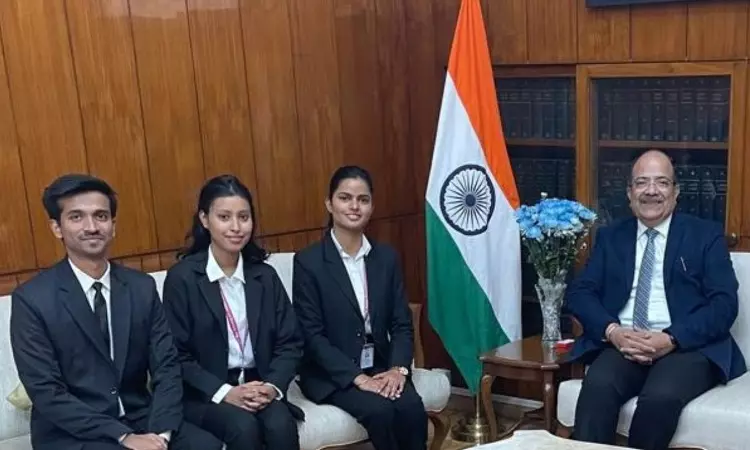NLU, Prayagraj Launches Interactive Series 'Beyond The Judgements' With The Chief Justice Arun Bhansali
LIVELAW NEWS NETWORK
9 April 2025 5:45 PM IST

Dr. Rajendra Prasad National Law University (RPNLU), Prayagraj, under the leadership of Sr. Prof. (Dr.) Usha Tandon, Vice-Chancellor launched a new interactive series titled “Beyond the Judgements”, aimed at providing the students a deeper understanding of the law, lives, experiences, and values of Judicial luminaries. The program intends to broaden the horizon of the budding lawyers about the real-world wisdom of the Bench.
In the inaugural episode, a team of students, Ms. Stuti Mishra, Sujal Sonker, and Ms. Khushi Shandilya, interacted with Justice Arun Bhansali, Chief Justice of the Allahabad High Court. The conversation offered rich insights into his professional journey, personal values, and views on pressing issues in the legal system.
Justice Bhansali third generation lawyer began by reflecting on his entry into the legal profession in 1989, noting that it was not a chance decision but a conscious decision. He reminisced about a time when legal practice was driven by physical libraries rather than technology. He also raised a concern about the lack of stipends for junior lawyers that still persists today. However, he emphasized the long-term value of learning under senior advocates, which ultimately pays off with time and dedication.
Sharing his experience of working in both Rajasthan and Allahabad High Courts, he explained the difference between serving as a judge and taking up the administrative responsibilities of a Chief Justice. “As a judge, your only responsibility is to deliver justice, but as a Chief Justice, you must also manage the administrative machinery of the entire High Court and district judiciary,” he noted. Interestingly, he also pointed out that the Rajasthan and Allahabad High Courts share a historical connection, as the first three Chief Justices of Rajasthan were from Allahabad and they established a tradition in the Rajasthan High Court which is not different from Allahabad High Court.
Addressing the ever-relevant tension between legal principles and public opinion, Justice Bhansali firmly asserted that judges must adhere to legal doctrines. He stressed the importance of neutrality and legal objectivity in judicial decision-making. In situations where personal beliefs may conflict with the application of law, he opined that the most appropriate course of action for a judge is to recuse from the matter.
When asked to recount a particularly complex or impactful case from his judicial career, Justice Bhansali shared a moving anecdote involving a physically challenged woman whose candidature was initially rejected by the recruitment board. Even though both parties in court—petitioner and respondent—were inclined towards rejecting the petition, Justice Bhansali carefully examined the legal provisions and ultimately delivered a judgement in favour of the girl, reinforcing the judiciary's role as the protector of marginalized voices.
Justice Bhansali also opened a personal window into his life, and shared his passion for philately (stamp collection) and gardening. His love for philately began in childhood, when he started collecting stamps issued since 1947and carefully preserving them. Over time, it turned into a lifelong hobby, teaching him patience, attention to detail, and a deep appreciation for history and culture. He also developed a unique interest of taking autographs of the person in whose honor the stamp is issued or from their family members. He shared his old days enthusiasm when he took autograph dignitaries including Mother Teresa on a first-day cover, Prince Charles on the stamp of Lord Mountbatten, and autograph of Dalai Lama on his stamp cover to name a few. That is how the signatures made he made those stamps unique and rare.
Discussing long-term reforms, he advocated for faster delivery of justice, increasing the number of judges, and strengthening the legal capabilities of young lawyers. He also expressed concern about the misuse of the idea of “transparency,” which sometimes becomes a means to exert undue pressure. Certain matters, he emphasized, must remain within the boundaries of confidentiality.
Justice Bhansali then shared his views on gender equality in the legal profession. Discussing one of his notable judgments where he stated: “A son continues to be a son both before and after marriage; a daughter continues to be a daughter irrespective of being married or unmarried”, he added that dependency remains a legal criterion for compensation. On encouraging women in law, he acknowledged the difficulties women face in sustaining their careers and suggested building strong professional partnerships early as a solution.
As the Chancellor of RPNLU, He concluded with a heartfelt message to the students of RPNLU: “There is no substitute for hard work and patience. Many brilliant people lose their way due to impatience. Whether in profession, friendship, or family life—patience helps avoid conflict and leads to success.” He extended his best wishes to the students, encouraging them to stay committed to their goals.


